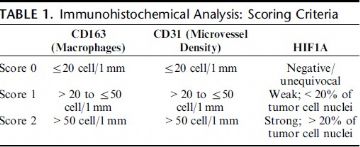| 图片: | |
|---|---|
| 名称: | |
| 描述: | |
- 病例学习(Number 3 )
| 姓 名: | ××× | 性别: | 年龄: | ||
| 标本名称: | |||||
| 简要病史: | |||||
| 肉眼检查: | |||||
免疫组化也能这样提示预后,这样提示转移浸润的可能性
Myometrial Invasion and Lymph Node Metastasis in Endometrioid Carcinomas: Tumor-associated Macrophages, Microvessel Density,and HIF1A Have a Crucial Role
(Am J Surg Pathol 2010;34:1708–1714)
Abstract: Myometrial invasion is an independent prognostic parameter of the endometrioid carcinomas which correlates with the risk of metastasis to pelvic and/or paraaortic lymph nodes.Recognition of myometrial invasion is sometimes difficult. In fact, myoinvasion is overdiagnosed in routine practice in as many as 25% of the cases. Recently, it has been observed that tumor-associated macrophages stimulate angiogenesis and promote cancer dissemination. Tumor macrophages (CD163),
microvessel density (CD31), and hypoxia inducible factor 1 a subunit (HIF1A) were investigated in 64 primary endometrioid carcinomas with (50 cases) and without (14 cases) myometrial invasion as well as in the corresponding regional lymph nodes metastases of 20 of the myoinvasive tumors. Endometrioid carcinomas with myometrial invasion showed higher number of CD163-tumor macrophages and greater microvessel density than endometrioid carcinomas without myometrial invasion
(P=0.000 and P=0.000, respectively). In carcinomas confined to the corpus uteri (stage I), expression of HIF1A was associated with deep myoinvasion (stage IC) (P=0.006). There was a significant relationship between microvessel density and CD163-macrophages both in the myoinvasive and nonmyoinvasive tumors. On the other hand, high-grade endometrioid carcinomas had more macrophage infiltrates and microvessels than low-grade tumors (P=0.03 and P=0.07). Also, there was a positive correlation between CD163-macrophages and microvessel
density in the primary tumors and their corresponding
regional lymph node metastases. These findings link increased microvessel proliferation to stromal macrophage infiltrate and suggest that enhanced tumor angiogenesis, triggered by stromal macrophages, regulates the progression of endometrioid carcinomas The identical stroma microenvironment found in the primary and the corresponding metastatic tumor suggests that tumor stroma response is determined by the intrinsic biology of the tumor.
-
本帖最后由 于 2011-03-16 17:34:00 编辑















